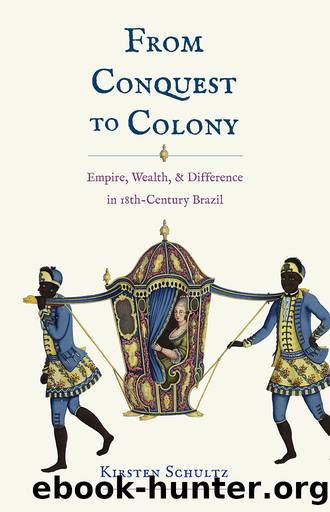From Conquest to Colony by Kirsten Schultz

Author:Kirsten Schultz
Language: eng
Format: epub
Publisher: Yale University Press
Published: 2023-05-15T00:00:00+00:00
Epilogue
In 1779 it was Queen Maria Iâs turn, just two years into her reign (1777â1816), to summon learned men in Portugal to gather as an academy. In this case, rather than history, it was a self-consciously Enlightened science that was to guide their quests to discern how the Portuguese ânationâ could âknow perfectly the lands that they inhabit, what those lands contain and produce, and their capacities,â and thereby defend imperial sovereignty and prosperity.1 The inquiries that took shape within the new Academia das Ciências de Lisboa (Academy of Sciences of Lisbon) were predicated on recognition of how, in the preceding decades, Brazilian treasure and other forms of American wealth had transformed the empireâs politics and economy. As the locus of imperial opulence and power shifted to Portuguese America, the postconquest imperative of political incorporation and the re-creation of an old regime of allegiance, honors, and rewards had given ground to inquiries and debates about how to more systematically increase and better administer the circulation of wealth within imperial networks of exchange.
These inquiries and debates were transimperial.2 From vantage points in Brazil and Portugal, as well as England and France, and through the lens of rivalry, the Portuguese drew on new analyses of wealth and the purposes of empire that encompassed their empireâs past and present to reckon with the consequences of American treasure and commerce. As the mercantilist idea that, as colonies, extra-European territories were to function as sources of raw materials and markets became a commonplace, royal officials also sought to discern how that function could be sustained in practice. Along with commercial regulations, they envisioned an American socioeconomic order in which legal, political, and social differences would abet certain forms of production and consumption that would enrich the kingdom of Portugal. In taxation and settlement schemes, new policies for Indigenous labor and administration, and ad hoc yet unremitting efforts to increase the transatlantic slave trade, royal and local officials sought to forge in Brazil societies and economies that complemented rather than reproduced those in Portugal. Notwithstanding contemporary appeals to trade as a peaceful counterpart to war in imperial contests, new policies charted pursuits of commercial prosperity by recalibrating rather than forgoing imperial violence. The mercantilist socioeconomic projects formulated within the circles of Portuguese royal authority were also contested and negotiated, among officials, in Atlantic ports, and on the ground in Brazil. As vassals of the crown, people in Brazil continued to appeal to transatlantic continuities of rights and royal justice. Yet, especially in enclaves of Portuguese settlement, the claim that, within the âsystemâ of Portuguese rule, Brazil had been transformed from a conquest into a colony took hold.3 American empire was constituted in an ambitious and unfolding socio economic regulatory project. Within the Portuguese monarchyâs territories, as the Italian-born natural scientist Domenico Vandelli reported to the new Academia das Ciências, utility would flow from âregulatingâ âall the branches of civil economyâ based on âprinciples deduced from a sound political arithmetic.â4
Yet, as Vandelli also argued, for imperial administrative
Download
This site does not store any files on its server. We only index and link to content provided by other sites. Please contact the content providers to delete copyright contents if any and email us, we'll remove relevant links or contents immediately.
| Argentina | Bolivia |
| Brazil | Chile |
| Colombia | Ecuador |
| Guyana | Paraguay |
| Peru | Suriname |
| Uruguay | Venezuela |
Cat's cradle by Kurt Vonnegut(15333)
Pimp by Iceberg Slim(14481)
4 3 2 1: A Novel by Paul Auster(12371)
Underground: A Human History of the Worlds Beneath Our Feet by Will Hunt(12085)
The Radium Girls by Kate Moore(12014)
Wiseguy by Nicholas Pileggi(5769)
The Fire Next Time by James Baldwin(5431)
Perfect Rhythm by Jae(5396)
American History Stories, Volume III (Yesterday's Classics) by Pratt Mara L(5298)
Paper Towns by Green John(5177)
Pale Blue Dot by Carl Sagan(4996)
A Higher Loyalty: Truth, Lies, and Leadership by James Comey(4950)
The Mayflower and the Pilgrims' New World by Nathaniel Philbrick(4487)
The Doomsday Machine by Daniel Ellsberg(4484)
Killers of the Flower Moon: The Osage Murders and the Birth of the FBI by David Grann(4435)
The Sympathizer by Viet Thanh Nguyen(4384)
Too Much and Not the Mood by Durga Chew-Bose(4337)
The Borden Murders by Sarah Miller(4312)
Sticky Fingers by Joe Hagan(4188)
